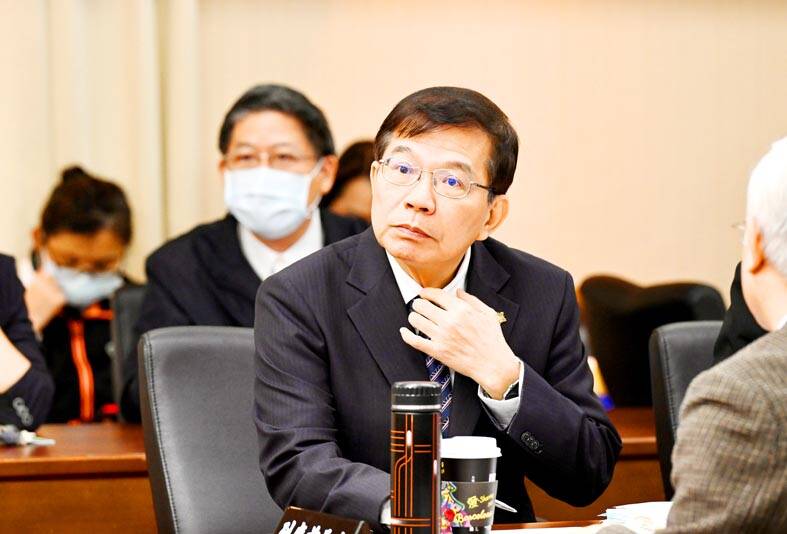Minister of Transportation and Communications Wang Kwo-tsai (王國材) yesterday assured lawmakers that there would not be any consumer disputes resulting from tour cancelations when the ban on group travel to China is lifted in March next year.
Wang made the remarks at the legislature’s Transportation Committee, which was scheduled to review the budget plans of the agencies under the Ministry of Transportation and Communications (MOTC).
However, lawmakers expressed concern over conflicting statements about the policy from the MOTC and Mainland Affairs Council (MAC).

Photo: Lo Pei-de, Taipei Times
MOTC officials said two-way group travel across the Taiwan Strait would return to normal in March and travel agencies could begin organizing tours, while MAC officials reiterated the number of Taiwanese group travelers allowed to visit China would still be capped at 2,000 per day, with the same cap applying to Chinese tourists to Taiwan.
Chinese Nationalist Party (KMT) Legislator Hung Meng-kai (洪孟楷) asked Wang exactly how many Taiwanese group travelers would be allowed to visit China per day when the ban is lifted in March, and whether travel agencies would be asked to cancel tours if the number of Taiwanese tourists exceeds the daily cap set by government.
Hung also pressed Wang for the adjustments on the cap that the ministry would make when more than 2,000 group travelers are to visit China per day.
“We had estimated that there would not be too many travelers at the beginning. The cap is adjustable, and I would not let disputes resulting from tour cancellations happen,” Wang said.
“I do not care what the MAC would say. The conclusion from cross-departmental meetings for now is that all group tours to China would be allowed in March so long as travel agencies have enough tourists to form tour groups,” Wang said.
Hung also suggested that a minister without portfolio be assigned to coordinate between the MOTC and Ministry of Labor about bringing in migrant workers to address the labor shortage problem facing the hotel and accommodation industry.
“The MOTC estimated that the hotel and accommodation operators are short of 3,000 workers, but the labor ministry is mainly concerned about the employment of women, senior workers and economically disadvantaged individuals. While most countries are busy attracting international tourists around the globe, officials in Taiwan are minding their own businesses and are busy passing the buck,” Hung said.
Wang said he had maintained communication with Minister of Labor Hsu Ming-chuen (許銘春).
“The country has not yet opened the service sector to migrant workers. The labor ministry is concerned that other service industry operators might request to follow suit if it makes an exception to hotels and accommodation service operators,” Wang said.
Tourism Administration Director-General Chou Yung-hui (周永暉) said that the labor ministry is to convene a meeting to review the administration’s proposal about recruiting migrant workers to address the labor shortage problem in the hotel and accommodation industry, adding that it has provided more analyses this time as requested by the labor ministry.

Taiwan has received more than US$70 million in royalties as of the end of last year from developing the F-16V jet as countries worldwide purchase or upgrade to this popular model, government and military officials said on Saturday. Taiwan funded the development of the F-16V jet and ended up the sole investor as other countries withdrew from the program. Now the F-16V is increasingly popular and countries must pay Taiwan a percentage in royalties when they purchase new F-16V aircraft or upgrade older F-16 models. The next five years are expected to be the peak for these royalties, with Taiwan potentially earning

STAY IN YOUR LANE: As the US and Israel attack Iran, the ministry has warned China not to overstep by including Taiwanese citizens in its evacuation orders The Ministry of Foreign Affairs (MOFA) yesterday rebuked a statement by China’s embassy in Israel that it would evacuate Taiwanese holders of Chinese travel documents from Israel amid the latter’s escalating conflict with Iran. Tensions have risen across the Middle East in the wake of US and Israeli airstrikes on Iran beginning Saturday. China subsequently issued an evacuation notice for its citizens. In a news release, the Chinese embassy in Israel said holders of “Taiwan compatriot permits (台胞證)” issued to Taiwanese nationals by Chinese authorities for travel to China — could register for evacuation to Egypt. In Taipei, the ministry yesterday said Taiwan

Taiwan is awaiting official notification from the US regarding the status of the Agreement on Reciprocal Trade (ART) after the US Supreme Court ruled US President Donald Trump's global tariffs unconstitutional. Speaking to reporters before a legislative hearing today, Premier Cho Jung-tai (卓榮泰) said that Taiwan's negotiation team remains focused on ensuring that the bilateral trade deal remains intact despite the legal challenge to Trump's tariff policy. "The US has pledged to notify its trade partners once the subsequent administrative and legal processes are finalized, and that certainly includes Taiwan," Cho said when asked about opposition parties’ doubts that the ART was

If China chose to invade Taiwan tomorrow, it would only have to sever three undersea fiber-optic cable clusters to cause a data blackout, Jason Hsu (許毓仁), a senior fellow at the Hudson Institute and former Chinese Nationalist Party (KMT) legislator, told a US security panel yesterday. In a Taiwan contingency, cable disruption would be one of the earliest preinvasion actions and the signal that escalation had begun, he said, adding that Taiwan’s current cable repair capabilities are insufficient. The US-China Economic and Security Review Commission (USCC) yesterday held a hearing on US-China Competition Under the Sea, with Hsu speaking on